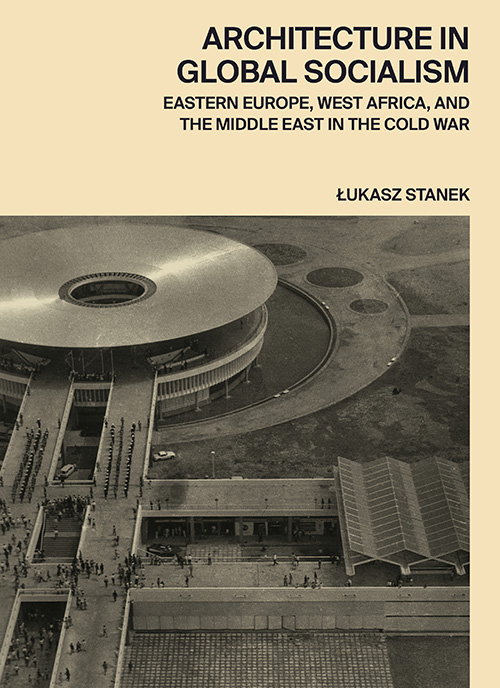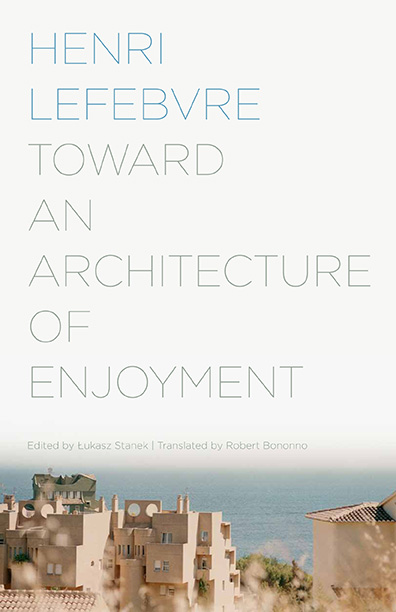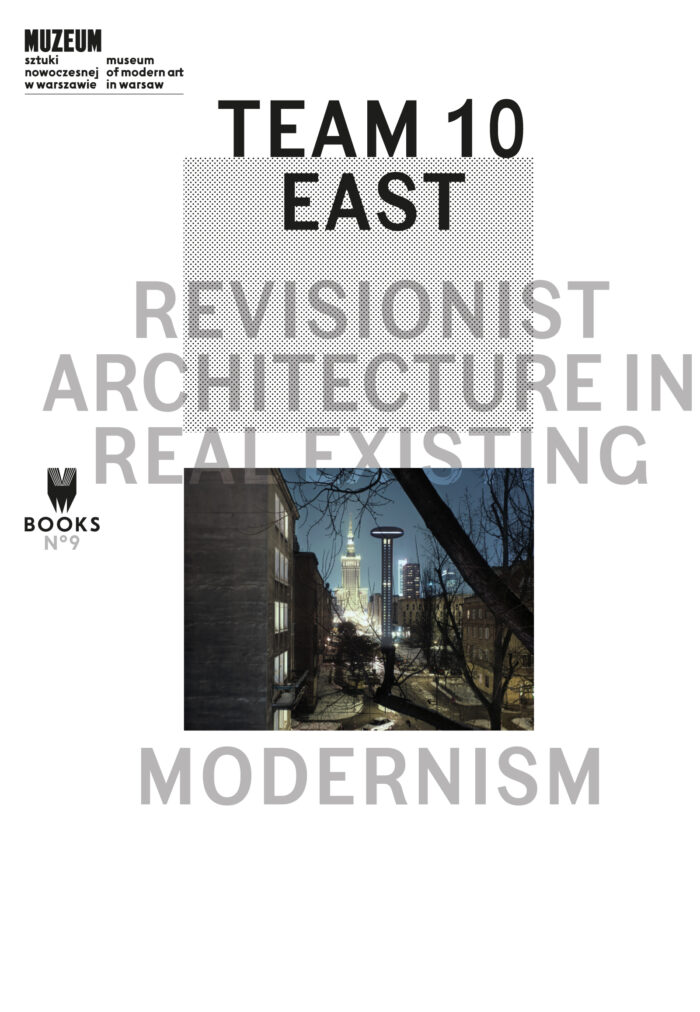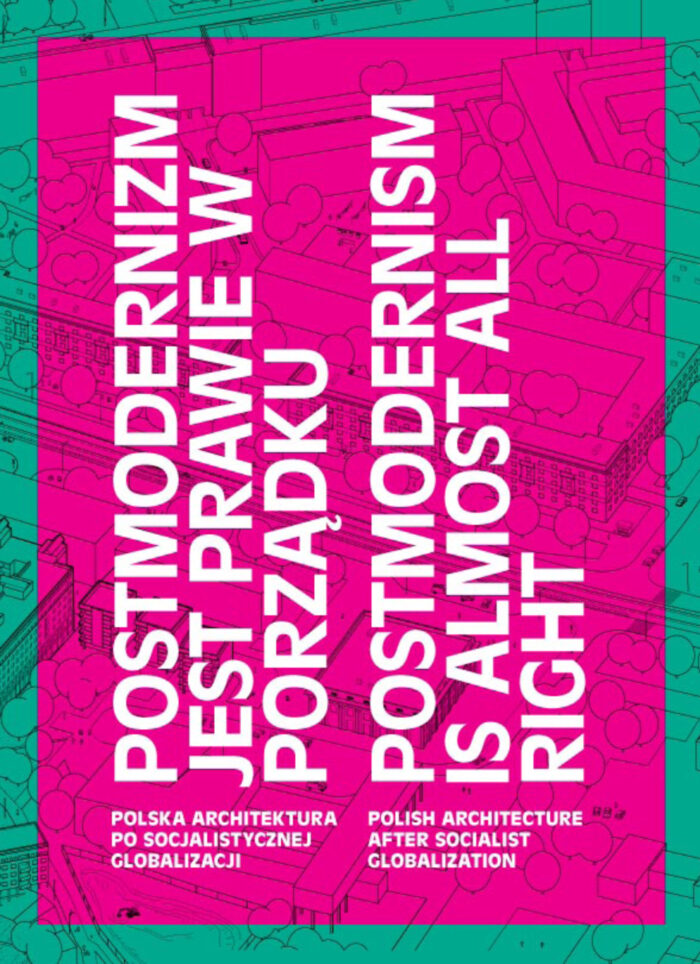Architecture in Global Socialism: Eastern Europe, West Africa, and the Middle East in the Cold War (Princeton University Press, 2020)
Henri Lefebvre on Space. Architecture, Urban Research, and the Production of Theory (University of Minnesota Press, 2011)
Toward an Architecture of Enjoyment by Henri Lefebvre (University of Minnesota Press, 2011)
Team 10 East. Revisionist Architecture in Real Existing Modernism (Museum of Modern Art in Warsaw/ University of Chicago Press, 2014)
Postmodernism Is Almost All Right. Polish Architecture after Socialist Globalization (Warsaw: Fundacja Bęc-Zmiana, 2012)
Urban Revolution Now. Henri Lefebvre in Social Research and Architecture (Ashgate/ Routledge, 2014)

Architecture in Global Socialism: Eastern Europe, West Africa, and the Middle East in the Cold War
Princeton University Press, 2020
In the course of the Cold War, architects, planners, and construction companies from socialist Eastern Europe engaged in a vibrant collaboration with those in West Africa and the Middle East in order to bring modernization to the developing world.
Architecture in Global Socialism shows how their collaboration reshaped five cities in the Global South: Accra, Lagos, Baghdad, Abu Dhabi, and Kuwait City. The book describes how local authorities and professionals in these cities drew on Soviet prefabrication systems, Hungarian and Polish planning methods, Yugoslav and Bulgarian construction materials, Romanian and East German standard designs, and manual laborers from across Eastern Europe. It explores how the socialist development path was adapted to tropical conditions in Ghana in the 1960s, and how Eastern European architectural traditions were given new life in 1970s Nigeria. It looks at how the differences between socialist foreign trade and the emerging global construction market were exploited in the Middle East in the closing decades of the Cold War. The book demonstrates how these and other practices of global cooperation by socialist countries—or socialist worldmaking—left their enduring mark on urban landscapes in the postcolonial world.
Featuring an extensive collection of previously unpublished images, Architecture in Global Socialism draws on original archival research on four continents and a wealth of in-depth interviews. It presents a new understanding of global urbanization and its architecture through the lens of socialist internationalism, challenging long-held notions about modernization and development in the Global South.
Praise:
“Architecture in Global Socialism is a major contribution. This is a brilliantly original book that fundamentally recasts our understanding of architecture in a worldwide frame. It will become a canonical reference point for scholars and students of postwar global architecture.”—Neil Brenner, professor of urban theory, Harvard University
“An indispensable resource for scholars that goes beyond architecture and urban planning to engage with broader historical and political issues.”—Jean-Louis Cohen, author of Architecture in Uniform and The Future of Architecture Since 1889
AWARDS AND RECOGNITIONS
Winner of the First Book Prize, International Planning History Society (2022)
Highly commended for the inaugural Architectural Book of the Year Award, History Category (2023)
One of the Financial Times’ Summer Books of 2020: Architecture
REVIEWS IN ENGLISH
Owen Hatherley, The Guardian, January 3, 2020
Fabrizio Gallanti, Abitare, 24 July 2020
John Hill, Archidose, October 22, 2020
Ben Tosland, Architectural Histories 8(1):7, 2020, 1–8
Holly Bushman, Art Margins, October 10, 2020
Alicja Gzowska, View. Theories and Practices of Visual Culture 26, 2020
Hannah Neate, Eurasian Geography and Economics, September 13, 2020
Edwin Heathcote, Financial Times, 27 June, 2020
Kimberly Zarecor, Journal of Architectural Education, December 18, 2020
Florian Urban, Planning Perspectives, June 4, 2020
Alexander Adams, The Critic, 21 August, 2020
Nick Leech, The National (Abu Dhabi), March 5, 2020
Clarence Hatton-Proulx, Urban History 47(4), 2020
Katarína Smatanová, A&U, 3-4 (2020)
Nadi Abusaada, Arab Urbanism (2020)
Paweł Wargan, Strelka Magazine, October 9, 2020
Gerry Hassan, Scottish Review, December 16, 2020
Tammy Gaber, American Journal of Islam and Society 38:1-2 (2021)
Vladimir Kulić, Traditional Dwellings and Settlements Review 32:2 (2021)
David Rifkind, The Art Bulletin, 103:1 (2021), 154-6
Victor Petrov, H-Net, May 9, 2021
Ayala Levin, Journal of the Society of Architectural Histoirans, 80:2 (2021)
Marcus Colla, German History 39:4 (2021), 651–2
Duanfang Lu, Fabrications 31:2 (2021)
Johan Lagae, H-Soz-Kult, October 1, 2021
Gábor Tolnai, Hungarian Geographical Bulletin 71:1 (2022), 87-90
Franklin Obeng-Odoom, Housing Studies, June 2, 2022
Hannah le Roux, The Journal of African History 1-2 (2022)
Tim Livsey, International Journal of African Historical Studies 55:1 (2022)
Iulia Statica, Architectural History 65 (2022)
Juliana Maxim, Journal of Urban History 49:2 (2023), 450-6
Federico Camerin, Contemporary European History (2023), 1-8
REVIEWS IN GERMAN
Gregor Harbusch, BauNetz, September 16, 2020
Christian Welzbacher, Kunstbuchanzeiger, October 23, 2020
REVIEWS IN ITALIAN
Alessandro de Magistris, Casabella 10 (914), 2020
Luka Skansi, Studi e ricerche di storia dell’architettura 4, 2021
REVIEWS IN FRENCH
REVIEWS IN SPANISH
Antonella Pataro, Arq.txt, August 29, 2021
Álvaro Sevilla-Buitrago, Revista EURE – Revista De Estudios Urbano Regionales 48:145 (2022)
REVIEWS IN POLISH
Thuc Linh Nguyen Vu, Szum 31 (2020), 80-99
Tomasz Fudala, Architektura Murator 4 (2021), 16
REVIEWS IN JAPANESE
Kengo Hayashi, Medium, October 9, 2020
REVIEWS IN CHINESE
Jia Min, Ji Si, 澎湃 The Paper, June 1, 2020
Ye Lui, 时代建筑 Time+Architecture 6 (2022)
REVIEWS IN CROATIAN
Mojca Smode Cvitanović, Život umjetnosti 107 (2020), 172–5
REVIEWS IN CZECH
Pavel Kalina, Paměť a dějiny 2 (2021), 131-3
REVIEWS IN NORWEGIAN

Henri Lefebvre on Space. Architecture, Urban Research, and the Production of Theory
University of Minnesota Press, 2011
This book offers a uniquely contextual appreciation of Henri Lefebvre’s idea that space is a social product. It explicitly confronts both the philosophical and the empirical foundations of Lefebvre’s oeuvre, especially his direct involvement in the fields of urban development, planning, and architecture.
Countering the prevailing view, which reduces Lefebvre’s theory of space to a projection of his philosophical positions, this book argues that Lefebvre’s work grew out of his empirical research on everyday practices of dwelling in postwar France and his exchanges with architects and planners. The book focuses on the interaction between architecture, urbanism, sociology, and philosophy that occurred in France in the 1960s and 1970s, marked by a shift in the processes of urbanization at all scales, from the neighborhood to the global level. Lefebvre’s thinking was central to this encounter, which informed both his theory of space and the concept of urbanization becoming worldwide.
The book offers a deeper and clearer understanding of Lefebvre’s thought and its implications for the present day. At a time when cities are increasingly important to our political, spatial, and architectural world, this reassessment proposes a new empirical and practical, interpretation of Lefebvre’s ideas on urbanism.
Praise:
“Henri Lefebvre’s diverse contributions to sociospatial and urban theory have inspired considerable commentary in recent years. Łukasz Stanek’s brilliant, erudite book takes the discussion to a new level of philosophical sophistication while also grounding Lefebvre’s work in relation to a series of concrete engagements with architecture and urbanism in postwar France. This is a pathbreaking work, indispensable for anyone concerned to understand Lefebvre’s powerful contemporary resonance as an urban thinker.” —Neil Brenner, University of Chicago
“This book is a strong and important reassessment of the theories and writings of Lefebvre. As cities are becoming more and more an essential part of our political, spatial, and architectural world, Lukasz Stanek launches a type of new generational take on Lefebvre, one that is both more contextual and more speculative.” —Mark Jarzombek, MIT
REVIEWS IN ENGLISH
Louis Moreno, Annals of the Association of American Geographers 102:1 (2012), 5-10
Ljiljana Blagojevic, The Journal of Architecture 17:5 (2012), 807-12
Jean Louis Violeau, Architectural Theory Review 16:3 (2012), 319-21
Christopher Knoll, Space and Culture, March 5 (2012)
Matteo Marasco, Urban Studies 50:2 (2013), 443-45
Silke Steets, International Journal of Urban and Regional Research 38:3 (2014)
Ulrike Gerhard, Urban Geography 35:6 (2014)
Greig Charnock, Antipode, September (2014)
Gisele Eugenia O’Connell, Studies in Social and Political Thought 24 (2014)
REVIEWS IN FRENCH
Caroline Maniaque, Archiscopie 112 (2013), 26-7
Grégory Busquet, Métropolitiques, 10 July 2013
Jean-Louis Violeau, Urbanisme 383 (2012)
REVIEWS IN SPANISH
Alvaro Sevilla Buitrago, Revista bibliografica de geografia y ciencias sociales 17:986 (2012)
REVIEWS IN GERMAN
Uta Gelbke, Grazer Architektur Magazin 9 (2013), 217-9
Elisa Bertuzzo, disP – The Planning Review (ETH Zurich), 48:2 (2012), 118

Toward an Architecture of Enjoyment
by Henri Lefebvre
University of Minnesota Press, 2014
Edited by Łukasz Stanek, translated by Robert Bononno
The relationship between bodily pleasure, space, and architecture—from one of the twentieth century’s most important urban theorists.
Praise:
“Stanek’s work has already taken scholarship on Henri Lefebvre’s concept of space to an unprecedented level of philosophical sophistication. With the discovery of this new text, Stanek escorts Lefebvre to the center of architecture theory since 1968. Lefebvre’s conceptual text and Stanek’s exquisite Introduction together enable the possibility of thinking not about architecture, but thinking architecturally about how we inhabit our world. Toward an Architecture of Enjoyment takes us toward a concept of the architectural imagination that is a powerful mediator between thought and action.”—K. Michael Hays, Harvard Graduate School of Design
“We finally have access to [Henri Lefebvre’s] most forceful meditation on the spatial utopia he aspired to. We owe the rescue and publication of this notable book to the perseverance and talent of Łukasz Stanek, who wrote the volume’s excellent and comprehensive introduction.”—Environment & Planning D: Society and Space
REVIEWS IN ENGLISH
Gastón Gordillo, Society and Space, September 19, 2014
Japhy Wilson, Antipode, October 2014
Daisy Froud, Icon, November 2014
Jan Baetens, Leonardo Reviews, December 2014
Owen Hatherley, The Architectural Review, March 2015
Patrick Gamsby, Canadian Journal of Sociology, March 2015
Camillo Boano, The Journal of Architecture, May 2015
REVIEWS IN GERMAN

Team 10 East. Revisionist Architecture in Real Existing Modernism
Museum of Modern Art in Warsaw/ distributed by University of Chicago Press, 2014.
Edited by Łukasz Stanek
This volume coins the term “Team 10 East” as a conceptual tool to discuss the work of Team 10 members and fellow travelers from state-socialist countries—such as Oskar Hansen of Poland, Charles Polónyi of Hungary, and Radovan Nikšic of Yugoslavia. The book’s contributors approach these individuals from a comparative perspective on socialist modernism in Central and Eastern Europe and discuss the relationship between modernism and modernization across the Iron Curtain. Team 10 East addresses “revisionism” in state-socialist architecture and politics, showing how architects appropriated, critiqued, and developed postwar modernist architecture and functionalist urbanism both from within and beyond the confines of a Europe split by the Cold War.
REVIEWS IN ENGLISH
Luka Skansi, Abitare 538 (2014), 113
John Hill, Archidose, September 15, 2014
REVIEWS IN GERMAN

Postmodernism Is Almost All Right. Polish Architecture after Socialist Globalization
Warsaw: Fundacja Bęc-Zmiana, 2012
Text by Łukasz Stanek, archival research and interviews: Piotr Bujas, Alicja Gzowska, Aleksandra Kędziorek, Łukasz Stanek
This catalogue of the exhibition Postmodernism Is Almost All Right interrogates the generational experience of Polish architects in the Middle East and North Africa during the 1970s and 1980s, and the impact of this experience on the production of Polish cities after socialism.
Design: Jayme Yen

Urban Revolution Now. Henri Lefebvre in Social Research and Architecture
Ashgate/ Routledge, 2014
Edited by Łukasz Stanek, Christian Schmid, and Ákos Moravánszky
This edited volume reconsiders worldwide urbanization processes in the 20th century by means of concepts such as “urban revolution,” “everyday life,” “production of space,” “rhythmanalysis,” and the “right to the city.” It results from two conferences at Delft University of Technology (2008) and ETH Zurich (2009).
REVIEWS IN ENGLISH
Do Young Oh, The LSE Review of Books, May 2015
Nathaniel Coleman, Cambridge Review of International Affairs, October 2015
James Thompson, Urban Geography, March 2016
Vaso Makrygianni, UGRG, April 2016